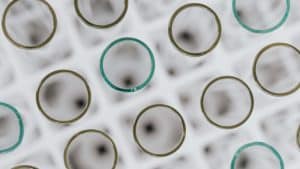Endometriosis is a disorder in which tissue similar to that which forms the lining of the uterus continues to grow outside of the uterine cavity. This tissue is referred to as the endometrium and in the case of endometriosis, it continues to grow on the ovaries, the lining of the pelvis, and even the intestines. When endometrial tissue grows outside of the uterus, it is referred to as an endometrial implant.
Why Hormones Are Critical In Endometriosis
Endometrial implants are still affected by the hormonal changes of the menstrual cycle, causing these areas to become inflamed and painful.
Due to the inflammation, this tissue of the implants will thicken and break down. Once the tissue is broken down, it is trapped in the pelvis region which can cause a variety of problems such as adhesions, severe internal scarring, severe pain, and fertility complications.
Because hormones are critical in regards to endometrial implants and their subsequent symptoms, it is important to dive deeper to gain an understanding of the specifics of hormone function in regards to endometriosis as a condition:
What Is Estrogen?
Estrogen is considered a “female hormone” but is present in both males and females at varying levels. Estrogen is involved in a variety of body systems and it primarily plays a role in the development and functions of the: uterus, breasts, vagina, and ovaries. Consequently, one of the most critical roles of estrogen is in reproduction and the regulation the menstrual cycle.
It is important to note that in both men and women, estrogen is instrumental outside of reproductive health and is involved in maintaining: bones, hair, blood vessels, and pelvic muscles.
Estrogen is mainly produced by the ovaries in women. Fat cells and adrenal glands also produce estrogen in small amounts small amounts.
Estrogen and Endometriosis
Although endometriosis is a condition that deserves to have more research dedicated to it, is considered an estrogen-dependent condition.
Some studies suggest that the endometrium growing outside the uterus produces extra estrogen. This leads to overall higher levels of estrogen in the body.
In exacerbating this issue, it is thought that the elevated estrogen levels that occur with endometriosis triggers the growth of endometrium in the body. This contributes to inflammation and symptoms such as:
- Heavy, painful periods
- Weight gain
- Fatigue
- Mood changes
(We will dive more into these symptoms below)
What Is Progesterone?
Progesterone is a natural sex hormone the female body secretes after ovulation. This hormone is essential for regulating your menstrual cycle and maintaining a healthy pregnancy.
Progesterone is utilized in breast development, endometrium formation, preparing the body for breast feeding, ensuring an egg is not rejected during pregancy, and bone formation,
Progesterone and Endometriosis
Because progesterone plays a role in preventing excess growth of endometrium, endometriosis can be successfully managed with progesterone.
Progesterone is prescribed for endometriosis because research shows that, when taken continuously, it can thin the lining of the uterus as well as thin endometrial lesions outside the uterus itself. Amanika Kumar, MD, a gynecologic oncologist at the Mayo Clinic in Rochester, Minnesota states that, “Progesterone can quite the endometrial tissue in the abdomen,” by limiting its growth.
Unfortunately, the exact causal effect is not fully understood. Studies on rodents published in PLoS One in October 2016 found that introducing progesterone to mice limited the progression of endometriosis and decreased inflammation.
The opposite is also understood of progesterone and endometriosis: low levels of progesterone plus increased estrogen levels are thought to simultaneously play a role in endometriosis.
Learn more about the benefits of progesterone and endometriosis here
The Link Between Endometriosis and Hormones
As touched on above, patients with endometriosis often experience imbalanced levels of estrogen and progesterone in the body. This can impact endometriosis in many ways:
Heavy, Painful Periods
Estrogen and progesterone work together to prepare for a possible pregnancy each month. If pregnancy does not occur, these hormone levels start to drop after ovulation. This triggers the uterine lining to start breaking down and shedding with your period.
With endometriosis, the endometrium tissue outside the uterus responds to the same hormonal changes as your uterine lining. It swells and bleeds every month like your uterine lining.
The issue lies in that this tissue has nowhere to go. It can get trapped in the body and leads to inflammation and bleeding. This can contribute to heavy, painful periods or bleeding between periods.
Weight Gain
Many Endometriosis Warriors feel as though they experience weight gain, which is often thought of as water weight.
This is because estrogen is known to trigger fluid retention (while progesterone acts as a diuretic to help remove excess fluid from the body).
The combination of fluid retention with inflammation also can lead to bloating, contributing to the feeling of weight gain.
Fatigue and Exhaustion
An imbalance of hormone levels in your body can also contribute to fatigue, a common endometriosis symptom. A small 2020 study found that the vast majority of females living with moderate to severe endometriosis report experiencing a “bothersome” fatigue.
Experts hypothesize that fatigue may be a result of the body’s effort to remove the endometrium.
Mood
Low estrogen levels have been associated with mood swings and can trigger premenstrual syndrome (PMS). In the few weeks after ovulation that lead up to menstruation, women with endometriosis may feel heightened mood shifts at this time.
Please note that mood changes are also a common side effect of hormonal contraceptives. These work to manage endometriosis by stabilizing estrogen or progesterone levels or both.
Living with Endometriosis
Endometriosis is an incredibly difficult condition to manage, but you are not alone. At Holtorf Medical Group, our board-certified physicians have decades of experience in treating conditions associated with hormonal dysfunction. We can help you successfully manage your symptoms and improve your quality of life. Book your appointment today


